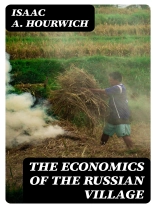Isaac A. Hourwich’s ‘The Economics of the Russian Village’ is a groundbreaking exploration of the economic structures and practices within the Russian peasant communities. Through a meticulous analysis of primary sources and statistical data, Hourwich provides a comprehensive overview of the agrarian economy of late 19th-century Russia, shedding light on the key factors influencing production, distribution, and consumption in the rural landscape. His detailed descriptions and economic theories offer valuable insights into the challenges and opportunities faced by Russian peasants during this transformative period. Written in a clear and accessible style, the book combines scholarly rigor with a practical understanding of economic principles, making it an indispensable resource for both academics and general readers interested in Russian history and economic development. Isaac A. Hourwich, a renowned economist and sociologist, drew on his expertise in labor economics and social theory to produce this seminal work on the Russian agrarian economy. His firsthand experience as a researcher and lecturer in Eastern European studies allowed him to delve deeply into the intricate economic relationships within the Russian village, providing a nuanced understanding of the peasant life and livelihoods. Hourwich’s interdisciplinary approach and commitment to empirical research ensure that ‘The Economics of the Russian Village’ remains a landmark study in the field of rural economics and historical sociology. I highly recommend ‘The Economics of the Russian Village’ to anyone seeking a comprehensive analysis of the economic dynamics of Russian peasant communities. Hourwich’s authoritative work offers a wealth of information and insights into the social and economic structures shaping the Russian countryside, making it essential reading for scholars, students, and enthusiasts of Russian history and economic history.
Yazar hakkında
Isaac A. Hourwich (1860–1924) was a noted economist, lawyer, and a passionate advocate for workers’ rights, whose academic and professional pursuits were often intertwined with the socialist movements of the early 20th century. Born into the tumultuous political landscape of the Russian Empire, Hourwich immigrated to the United States where he channeled his intellectual rigor into analyzing economic systems, particularly those pertaining to his homeland. His seminal work, ‘The Economics of the Russian Village, ‘ examines the intricate economic dynamics of rural Russia, bringing to light the conditions and struggles of peasants under the Tsarist regime. Hourwich’s scholarly approach combined empirical data with socio-economic theory and is recognized for its contribution to the field of economic history and its influential voice in discussions of agrarian reform. His balanced exposition and in-depth analysis reflect a deep understanding of the economic interdependencies and systemic issues affecting the rural poor. As an academic and an activist, Hourwich’s work extends beyond economics; he was equally reputed for his legal advocacy on behalf of immigrant workers and his role in progressive labor movements. Known for his erudite yet accessible style, Hourwich’s writings continue to be of significance to scholars interested in the socio-economic transformations of Russia and the broader impacts of those changes in global economic history.












